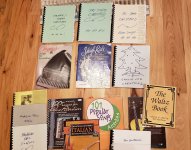Ok, friends and foes, here's the next challenge for us all!
Hopefully, if you participated in the "21 Tunes in 21 Weeks" challenge, you discovered some techniques to effectively hone your repertoire by adding new tunes in a scientific way.
Here the goal is to work toward the goal of "sight reading at playing speed." This means the ability to play your accordion to sheet music that you either have never seen, or have seen, and know, but have not played enough to have memorized or have "down cold." The sheet music should be at your playing ability level. The goal is to be able to expand your performance repertoire without hours of study of particular pieces. Ie. what if you could bring books of 300 or 3000 (internet) pieces to play at random, even if your audience is your dog sitting before the fire?
So, for the next 8 weeks, (starting October 3, 2021) your mission is to sight read 6 days a week. That's it! No time requirement, no recording necessary. Of course, you can post recordings if you are so inclined, guaranteed to improve the challenge for you.
You are encouraged to report your weekly progress and any insights you gain.
Ok, who's in and what do you think? What advice do you have on improving one's sight reading?
Hopefully, if you participated in the "21 Tunes in 21 Weeks" challenge, you discovered some techniques to effectively hone your repertoire by adding new tunes in a scientific way.
Here the goal is to work toward the goal of "sight reading at playing speed." This means the ability to play your accordion to sheet music that you either have never seen, or have seen, and know, but have not played enough to have memorized or have "down cold." The sheet music should be at your playing ability level. The goal is to be able to expand your performance repertoire without hours of study of particular pieces. Ie. what if you could bring books of 300 or 3000 (internet) pieces to play at random, even if your audience is your dog sitting before the fire?
So, for the next 8 weeks, (starting October 3, 2021) your mission is to sight read 6 days a week. That's it! No time requirement, no recording necessary. Of course, you can post recordings if you are so inclined, guaranteed to improve the challenge for you.
You are encouraged to report your weekly progress and any insights you gain.
Ok, who's in and what do you think? What advice do you have on improving one's sight reading?
Last edited:

